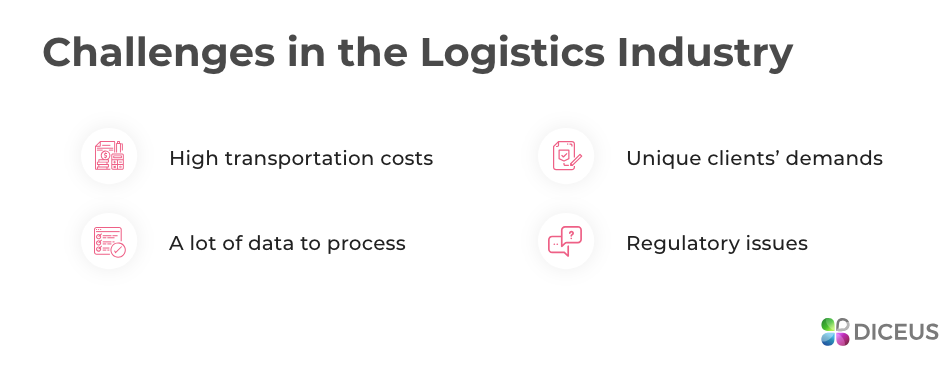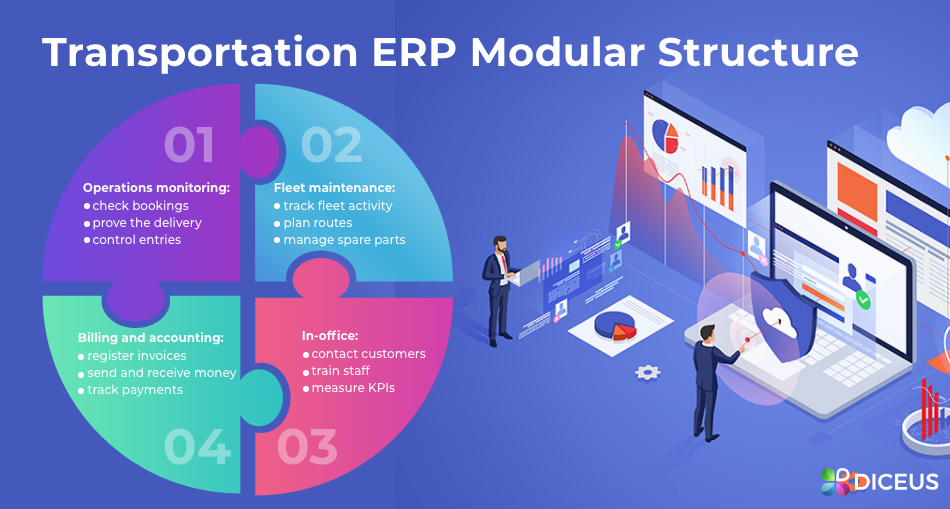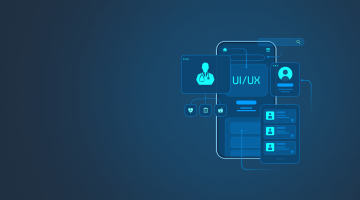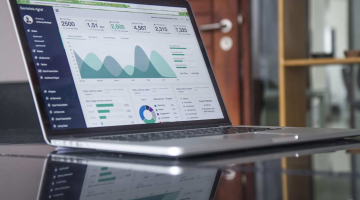
ERP for transport company: Design and implementation guide
Logistics and transport market sectors connect other industries and businesses via land, water, and air paths. Companies involved in these operations provide on-time, accurate delivery of raw materials or ready products, workers, and even information. Without proper logistics, everything can go wrong and lead to huge losses of money, time, and reputation. That’s why a top-notch ERP for transport company is highly desirable.
However, there are numerous questions related to ERP products. How to create or purchase an application? How to deploy it? What type and vendor is the best one? What are ERP advantages, and how can they solve existing logistics issues? Finally, what does ERP actually mean? In this guide, we will try to move through all of these questions and answer them in detail. If you want to know more about ERP for logistics, you’re in the right place!
Challenges in the transportation industry
As for now, you can forget about ERP and think about logistics. Probably, this sector is your native, or maybe, you only begin the business path, whatever. Currently, the industry faces several crucial challenges, including the main one — weak organizational change management. All companies have to deal with these tasks earlier or later.
- High transportation costs. Poor planning, not ideal routes, costly fuel — these problems lead to low profitability of the business. With elaborate management, it’s possible to develop a cost-effective approach to shipping.
- A lot of data. In the era of big data, you can’t avoid large data packages because they are essential for the team’s growth. Employees have to keep an eye on the fleet, staff, cargo, routes, bills, customer interaction, etc. Some of these tasks can be automated.
- More unique demands. Customers evolve together with businesses. Nowadays, both individuals and entities want to work on a personalized basis with a high level of customization. This point is more critical for multinational corporations, obviously.
- Regulatory issues. Traffic laws, parking nuances, and security rules differ from country to country and even from city to city. Surely, it’s important to know that your truck with apples will reach the final point without problems.

Now return to the idea of ERP. Modern services are powerful enough to deal with all the listed challenges, including financial issues, fleet monitoring, data processing, etc. The main pitfall here is that not all teams really need ERP apps. Thus, before ordering the software, ensure that you and your stakeholders know the company’s current and upcoming needs, business goals, and general vision. If an ERP platform suits your strategy, get it!
By the way, if you’re interested in accounting processes, be sure to check the guide related to ERP in finance.
ERP ideas in a nutshell
The simplest question is the most essential for all interested in ERP software. So, what does the ERP term stand for? Firstly, let’s answer this question regarding all ERP applications, regardless of specific tasks. Then, we want to dive deeper into the article topic and look at applications for logistics/transportation brands.
Basic ERP understanding
Enterprise software apps help managers organize work, automate daily tasks, and monitor all resources. Generally, there are two definitions of the term:
- ERP, as a strategic approach, focuses on the integration and optimization of the brand’s internal business activities.
- ERP, as a software tool, stores and processes vital company data to complete the idea of ERP as a strategic business task.
Together, these definitions result in the global vision of ERP as products designed for business optimization in terms of resources and processes. Any company can install an ERP app, but not all brands will get benefits from this software. Usually, it’s recommended to deploy an ERP system when you feel that business operations are out of your control or the team suffers from entangled processes.
Apart from these red flags, enterprise solutions are required for corporations with several departments or branches that need to contact each other regularly. With ERP for transport companies, all the parts will be connected through a single platform. Thus, managers benefit from ERP because they can easily track tasks and performance while employees have round-the-clock access to core data.
ERP for transport company importance
Let’s proceed to another question that doesn’t relate to our topic directly but can help to catch the idea. What’s the main driving force for software development?
The logistics industry is rising in terms of companies and their revenue. Hence, expanding brands should be interested in elaborate solutions that can handle scalability questions and overall optimization. Transportation management solutions can provide the following benefits:
- ERP saves time and money by helping to deliver goods right on time.
- ERP facilitates cooperation between all links of the supply chain.
- ERP monitors inventory using barcodes, RFID, and databases.
- ERP boosts analytics to continue logistics optimization.
- ERP delivers automation of fleet tracking, tasking, and reporting.
- ERP reduces errors because employees have fewer routine tasks.
TSM software logistics and structures
Moving to the main part of the guide, it’s the best moment to look at how ERP solutions are built. Earlier, we explored the overall importance and challenges that you can overcome thanks to ERP apps. But now, let’s focus on functional areas. Please, note that vendors can install other modules in different combinations, so always check what’s the structure of your ERP.
Tools for operations monitoring
Being the heart of the system, the operations module focuses on core transport/logistics processes for your firm. Using this set of tools, managers can easily control inventory and resources during the shipment process. Depending on specific features of your SCM, you can add or remove certain tools if you work with custom developers. In ready-made ERP systems, you will have to deal with predefined modules for TMS software logistics.
Examples of tasks for this module:
- Check bookings, stock, and shipment
- Prove the delivery
- Control entries for goods
- Automate reports on operations
- Monitor fleet movement
Fleet maintenance modules
Despite the previous module often including some tools for fleet management, there’s a dedicated system for the maintenance of your vehicles. On the one hand, this module helps your managers optimize fleet composition and quality in the garage. On the other hand, it’s more convenient to track lorries’ movement in real-time, agree on schedules and routes, and provide full support for different transport modes.
Examples of tasks for this module:
- Schedule vehicle services
- Maintain spare parts/tires
- Record fleet activity
- Manage insurance
- Plan routes and schedules
Transportation billing software
On par with direct delivery processes, companies have to remember accounting and billing. The large finance module handles all money issues, including cash exchange between your team and partners, invoicing, salaries, and payments for freight, labor, vehicles, and spare parts. Using a good ERP for the transport company, you can develop a cost-effective strategy with accurate money tracking.
Examples of tasks for this module:
- Register bills and invoices
- Customize contracts
- Send and receive money for anything
- Track payments
- Work with banks
Logistics office software
Last but not least, there’s another large module that includes all in-house stuff. Basically, its tasks can be concluded as wholesome strategy planning, which stands for optimization of process flows. Precisely, the official platform is responsible for payroll, reports, dashboards, HR tasks, customer interaction handled by integrated CRM tools, security, performance tracking and improvement, and so on. Often, this software is divided into smaller parts.
Examples of tasks for this module:
- Contact suppliers or customers
- Train staff members
- Measure KPIs
- Deliver reports and analytics
- Protect sensitive data
Read more about ERP for different industries: ERP for banks

Primary benefits of transportation management solutions
ERP applications are quite expensive as they have to suit the various needs of big corporations. From accounting tasks to fleet management, there are dozens of different processes which must be controlled. A modern ERP system should allow managers and employees to work with big data packages in real time. Thus, you should clearly realize the structures and advantages of ERP apps to understand how to plan to spend. Now, let’s talk about the pros.
Technology Evaluation Centers list three key benefits of ERP platforms, including reduced process times, increased collaboration, and centralized data. Particularly for transportation management solutions, the benefits are as follows:
- Optimized delivery plans. Manage distribution methods by adding or replacing them under one roof. Introduce omnichannel delivery strategies.
- Streamlined in-office processes. Optimize indirect logistics operations such as dashboards and workflows, payroll, reporting, and purchases.
- Higher data accuracy. Eliminate manual data control with automated solutions. Core info will be easily accessible anytime and anywhere.
- Better customer service. Use performance analysis and tracking results to improve KPIs and replace weak links with efficient delivery options.
- Reduced costs. Thanks to all the previous benefits, it helps to lower inventory and delivery costs by implementing just-in-time delivery without downtime.
Together, these points increase the speed and efficiency of all transportation processes. However, you should remember about costs. Study markets and business goals to understand do you really need an ERP. If the answer is yes, you can cooperate with our custom development team to get the perfectly tailored product with the necessary functions only.
Final insights
If you still have questions, feel free to ask our consultants. We’re here to help you find the best ERP for a transport company (most likely, for your own business). Our team handles the entire development process starting with analysis and ending with tech support for your team whenever you need it. All consultations are free, to note. Our devs are really smart folks who can create even the most complicated ERP system from scratch packing it with all the modules you really need. And if you don’t know what you need, we also will help!
FAQ
The last section we want to dedicate to essential information is packed in brief form. Explore these five questions to find answers and conclude the information from this guide.
What does the ERP abbreviation mean?
It stands for Enterprise Resource Planning and means both business strategy and applications that focus on company processes. As for TMS software logistics, these programs are tailored to the needs of transport companies, but their main principles are similar to ERP products from other industries.
What challenges are critical for logistics?
Mainly, modern transportation teams face four obstacles, including high delivery costs, big data to process, constantly evolving demands of customers, and different regulative requirements. In this case, ERP apps can solve all the mentioned issues by facilitating data flow, enhancing customer interactions, and reducing expenses thanks to more elaborate planning.
Why use ERP for transport companies?
Well, the answer is right above. ERP apps can solve all the existing problems in the modern logistics sector. They optimize both on-track and in-office operations, help managers measure performance, prove identity, facilitate document flow, and, finally, cut costs greatly. With software help, your staff can focus on working with clients, as well.
Which application type to deploy?
Basically, you have two options. Choosing between prepackaged apps, which come with fixed sets of functions, and bespoke systems, which are created exclusively for you, we’d opt for the latter one. The first option is sometimes good for SMBs whose needs are compliant with offers, but custom ERP for transport companies is wonderful in terms of ROI.
How many resources do you need for the launch?
Before ordering an ERP, plan the budget carefully. You should consider the costs of the software itself, costs of implementation and connection, training, and maintenance. Overall, prepackaged solutions range from $4,000 to $500,000, plus extra fees for support or upgrading. Custom apps may exceed even $1 million, but they have all possible expenses included in the final price.





